

Mindfulness and meditation can worsen depression and anxiety. By Clare Wilson Mindfulness and other types of meditation are usually seen as simple stress-relievers – but they can sometimes leave people worse off.

About one in 12 people who try meditation experience an unwanted negative effect, usually a worsening in depression or anxiety, or even the onset of these conditions for the first time, according to the first systematic review of the evidence. 5 Health Benefits of Daily Meditation According to Science. If there is one thing common in all of us, it is the flaming urge to be happy and satisfied in life.
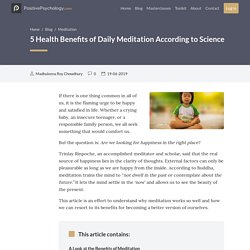
Whether a crying baby, an insecure teenager, or a responsible family person, we all seek something that would comfort us. But the question is: Are we looking for happiness in the right place? Trinlay Rinpoche, an accomplished meditator and scholar, said that the real source of happiness lies in the clarity of thoughts. External factors can only be pleasurable as long as we are happy from the inside. Meditation 101: A Beginner's Guide. The History and Origin of Meditation. Which Style of Meditation is Best for You? As my long-time friend and colleague, neuroscientist Richie Davidson, and I worked on our book, Altered Traits: Science Reveals How Meditation Changes Your Mind, Body, and Brain, we looked at thousands of scientific studies that reveal the impact of meditation.
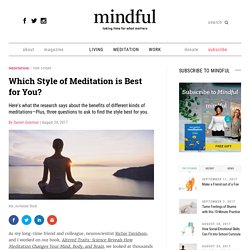
Not surprisingly, it turns out that some forms of meditation are more effective at promoting relaxation while other forms have a greater impact on relieving depression or the effects of trauma. Still others improve focus, and yet other types enhance compassion and kindness. To find out which practice is best for you, ask yourself these three questions: 1) What benefits are you looking for? Do you hope to relax? Top 10 Reasons to Meditate. The benefits of a meditation practice are no secret.
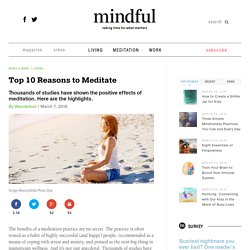
The practice is often touted as a habit of highly successful (and happy) people, recommended as a means of coping with stress and anxiety, and praised as the next-big-thing in mainstream wellness. And it’s not just anecdotal. Thousands of studies have shown the positive impact that meditating has on our health and well-being. We’ve culled through the list to bring you highlights from the early stages of research into mindfulness. Sleep Better: More Shut-Eye at Night Means Brighter Days Sleep isn’t just relaxation for eight hours a day—it’s essential to our cognitive functioning. Turns out it can even help serious sleep problems.
Stress Less: Make Room for More Happiness It’s a little-known secret that Wall Street execs, famous artists, and Silicon Valley whiz kids are some of the biggest advocates of meditation as a way to manage stress. Top 5 Myths about Mindfulness Meditation. Do you know the myths about mindfulness and what is true or false about this swelling revolution?

Take a look at what I think are the top five myths about mindfulness. Note: There are plenty more, but I thought these top the charts. Myth #1: Mindfulness if for taking a time-out from life, quieting the mind and reducing stress. Truth: I think this is the #1 myth out there because it’s my experience that this is how people initially experience the practice. One of the greatest entry points to mindfulness in the West is Mindfulness-Based Stress Reduction (MBSR). However, the initial practices can often give people sense of relief from a busy mind and can then be equated with a mental break. The paradox here is when we’re able to do just be present to our minds, emotions and bodies, the stressful relationship tends to quiet down, but when we try and quiet the mind down, we often add fuel to the fire. Myth #2: You need to carve out plenty of time in a serene “mindful” space.
Can Meditation be Dangerous? This is a story of Zen master, professor, poet, and essayist, Louis Nordstrom.

Over 35 years ago Louis renounced his tenure as a professor in philosophy and robed up to begin his life as a monk. In an NY Times interview with Chip Brown, Nordstrom conveyed some insights into the connection between his trauma and abandonment as a child that revealed a hidden motive in his work with meditation. He said: “The Zen experience of forgetting the self was very natural to me,” he told me last fall.
“I had already been engaged in forgetting and abandoning the self in my childhood, which was filled with the fear of how unreal things seemed.” For Nordstrom, meditation felt like a natural fit as there was a familiarity and calmness that came from detaching from thoughts, feelings, and emotions. In therapy he came to understand a subtle, yet subversive motive he had to engage in meditation. Harvard neuroscientist: Meditation not only reduces stress, here’s how it changes your brain. Buddhist and meditation teacher Tara Brach leads a Vipassana meditation group at the River Road Unitarian Church in Bethesda.
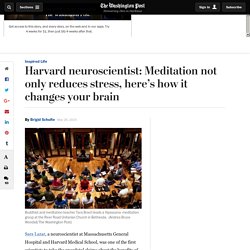
Physical Posture. The Power of Calm. The Top 10 Guided Meditations of 2018: Practicing Mindfulness with Chocolate. Have you always wanted to try mindfulness meditation but didn’t know where to start?
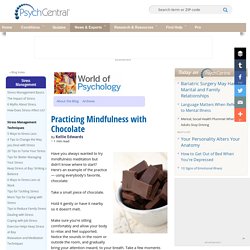
Here’s an example of the practice — using everybody’s favorite, chocolate: Take a small piece of chocolate. Hold it gently or have it nearby so it doesn’t melt. Make sure you’re sitting comfortably and allow your body to relax and feel supported. Notice the sounds in the room or outside the room, and gradually bring your attention inward, to your breath. Next bring your attention to the chocolate in your hand. Now smell the chocolate. Allowing your attention to soften now, so that you still have an awareness of the feel and smell of the chocolate, bring the chocolate to your mouth and take a small bite.
Now, place the rest of the chocolate in your mouth, enjoying the tastes and flavors, subtle and strong. Finally, when the chocolate is gone, bring your attention back to your senses. Enjoy! Chocolate photo available from Shutterstock.
Free Writing. Better than meditation Meditation is awesome.

It’s pretty much the simplest, cheapest way to improve your life that has ever been invented. The only problem with meditation is that it’s just too simple. I can’t get a hold of it for very long — it resists habitification. Maybe you know what I’m talking about? I’ve tried.